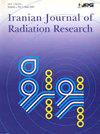Accuracy of empirical formulas in evaluation of neutron dose equivalent inside the 60Co vaults reconstructed for medical linear accelerators
Q4 Health Professions
引用次数: 3
Abstract
Background: In Southeast Europe medical accelerators are sometimes placed in small vaults originally built for Co treatment unit. In order to meet shielding requirements for high energy photon beams, the wall thickness had to be increased. Since the vaults are already limited in size, instead of adding more concrete, materials with high-Z elements were used. Limited vault size and addition of high-Z elements can contribute to the neutron dose equivalent for both medical personnel and patients. Materials and Methods: The most commonly used empirical equations for estimation of neutron dose equivalent at the maze door in the vault are by Kersey and Wu-McGinley. In order to assess accuracy of these equations, Monte Carlo (MC) simulations of various geometrical and compositional changes of vault were conducted. Neutron ambient dose equivalent (Hn(10)) was observed when dimensions of the vault walls were reduced gradually. Results: The empirical equations gave results with reasonable accuracy when vaults were of standard size. When the vault was decreased to the size of the usual Co unit vault, the most commonly used equations showed significant difference in results (up to 90%) in comparison to MC simulations. MC simulations showed that introducing different materials in shielding can change the neutron dose equivalent in vicinity of accelerators. Conclusion: For vaults limited in size, new simplified equation for neutron dose equivalent at the maze doors is presented, although performing a MC simulation of the specific vault is suggested.医用直线加速器60Co库内中子剂量当量经验公式的准确性
背景:在东南欧,医疗加速器有时被放置在最初为联合治疗单元建造的小金库中。为了满足高能光子束的屏蔽要求,必须增加壁厚。由于拱顶的尺寸已经受到限制,因此没有添加更多的混凝土,而是使用了具有高Z元素的材料。有限的拱顶尺寸和高Z元素的添加可能有助于医务人员和患者的中子剂量当量。材料和方法:最常用的估算拱顶迷宫门中子剂量当量的经验方程是由Kersey和Wu McGinley提出的。为了评估这些方程的准确性,对拱顶的各种几何和成分变化进行了蒙特卡罗(MC)模拟。当拱顶壁的尺寸逐渐减小时,观察到中子环境剂量当量(Hn(10))。结果:当拱顶为标准尺寸时,经验方程给出了具有合理精度的结果。当拱顶减小到通常Co单元拱顶的大小时,与MC模拟相比,最常用的方程显示出显著的结果差异(高达90%)。MC模拟表明,在屏蔽中引入不同的材料可以改变加速器附近的中子剂量当量。结论:对于尺寸有限的拱顶,尽管建议对特定拱顶进行MC模拟,但提出了迷宫门处中子剂量当量的新简化方程。
本文章由计算机程序翻译,如有差异,请以英文原文为准。
求助全文
约1分钟内获得全文
求助全文
来源期刊

Iranian Journal of Radiation Research
RADIOLOGY, NUCLEAR MEDICINE & MEDICAL IMAGING-
CiteScore
0.67
自引率
0.00%
发文量
0
审稿时长
>12 weeks
期刊介绍:
Iranian Journal of Radiation Research (IJRR) publishes original scientific research and clinical investigations related to radiation oncology, radiation biology, and Medical and health physics. The clinical studies submitted for publication include experimental studies of combined modality treatment, especially chemoradiotherapy approaches, and relevant innovations in hyperthermia, brachytherapy, high LET irradiation, nuclear medicine, dosimetry, tumor imaging, radiation treatment planning, radiosensitizers, and radioprotectors. All manuscripts must pass stringent peer-review and only papers that are rated of high scientific quality are accepted.
 求助内容:
求助内容: 应助结果提醒方式:
应助结果提醒方式:


